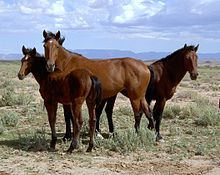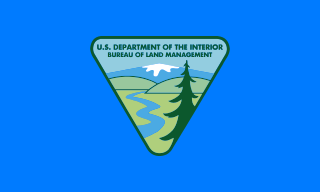
The Bureau of Land Management (BLM) is an agency within the United States Department of the Interior responsible for administering U.S. federal lands. Headquartered in Washington, D.C., the BLM oversees more than 247.3 million acres (1,001,000 km2) of land, or one-eighth of the United States's total landmass.
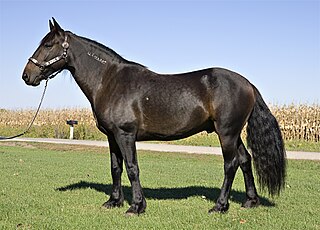
The mustang is a free-roaming horse of the Western United States, descended from horses brought to the Americas by the Spanish conquistadors. Mustangs are often referred to as wild horses, but because they are descended from once-domesticated animals, they are actually feral horses. The original mustangs were Colonial Spanish horses, but many other breeds and types of horses contributed to the modern mustang, now resulting in varying phenotypes. Some free-roaming horses are relatively unchanged from the original Spanish stock, most strongly represented in the most isolated populations.

A horse show is a judged exhibition of horses and ponies. Many different horse breeds and equestrian disciplines hold competitions worldwide, from local to the international levels. Most horse shows run from one to three days, sometimes longer for major, all-breed events or national and international championships. Most shows consist of a series of different performances, called classes, wherein a group of horses with similar training or characteristics compete against one another for awards and, often, prize money.

Equitation is the art or practice of horse riding or horsemanship.

Colonial Spanish horse is a term for a group of horse breed and feral populations descended from the original Iberian horse stock brought from Spain to the Americas. The ancestral type from which these horses descend was a product of the horse populations that blended between the Iberian horse and the North African Barb. The term encompasses many strains or breeds now found primarily in North America. The status of the Colonial Spanish horse is considered threatened overall with seven individual strains specifically identified. The horses are registered by several entities.
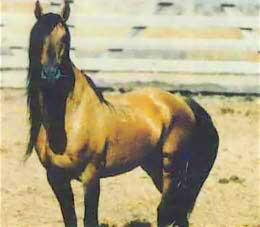
The Kiger mustang is a strain of mustang horse located in the southeastern part of the U.S. state of Oregon. The name applies only to wild-captured individuals and does not apply to their bred-in-captivity progeny, which are known as Kiger horses. The Bureau of Land Management (BLM) administers two herd management areas for Kiger mustangs in the Burns District—Kiger and Riddle Mountain, in the Steens Mountain area. DNA testing has shown that Kiger mustangs are descended largely from Spanish horses brought to North America in the 17th century, a bloodline thought to have largely disappeared from mustang herds before the Kiger horse populations were discovered in 1977.
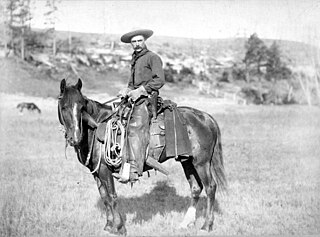
Western riding is considered a style of horse riding which has evolved from the ranching and welfare traditions which were brought to the Americas by the Spanish Conquistadors, as well as both equipment and riding style which evolved to meet the working needs of the cowboy in the American West. At the time, American cowboys had to work long hours in the saddle and often over rough terrain, sometimes having to rope a cattle using a lariat, also known as a lasso. Because of the necessity to control the horse with one hand and use a lariat with the other, western horses were trained to neck rein, that is, to change direction with light pressure of a rein against the horse's neck. Horses were also trained to exercise a certain degree of independence in using their natural instincts to follow the movements of a cow, thus a riding style developed that emphasized a deep, secure seat, and training methods encouraged a horse to be responsive on very light rein contact.

Madeleine Anne Pickens is a businesswoman and philanthropist who has lived in the United States since 1969. She is a developer of and stockholder in the Del Mar Country Club in Rancho Santa Fe, California, and the owner of the Mustang Monument: Wild Horse Eco-Resort near Wells, Nevada and the founder of Saving America's Mustangs. She is also a thoroughbred racehorse owner and breeder. She is the widow of American businessman Allen E. Paulson and former wife of multi-millionaire T. Boone Pickens.

Meredith Sue Hodges is an American equine trainer, competitor, educator, author and TV personality specializing in mules and donkeys, specifically the contemporary saddle mule.

Working equitation is an equestrian discipline. It is intended to promote competition between traditional styles of working riding used in various countries, and also to act as a showcase for traditional riding costumes and equipment. The world regulatory body is the World Association for Working Equitation.
The Pryor Mountains Wild Horse Range is a refuge for a historically significant herd of free-roaming mustangs, the Pryor Mountain mustang, feral horses colloquially called "wild horses", located in the Pryor Mountains of Montana and Wyoming in the United States. The range has an area of 39,650 acres (160.5 km2) and was established in 1968 along the Montana–Wyoming border as the first protected refuge dedicated exclusively for mustangs. It was the second feral horse refuge in the United States. About a quarter of the refuge lies within the Bighorn Canyon National Recreation Area. A group of federal agencies, led by the Bureau of Land Management, administers the range.

The Wild and Free-Roaming Horses and Burros Act of 1971 (WFRHBA), is an Act of Congress, signed into law by President Richard M. Nixon on December 18, 1971. The act covered the management, protection and study of "unbranded and unclaimed horses and burros on public lands in the United States."

The Pryor Mountain mustang is a substrain of mustang considered to be genetically unique and one of the few strains of horses verified by DNA analysis to be descended from the original Colonial Spanish horses brought to the Americas by the Spanish. They live on the Pryor Mountains Wild Horse Range located in the Pryor Mountains of Montana and Wyoming in the United States, and are the only mustang herd remaining in Montana, and one of sixteen in Wyoming. They are protected by the Wild and Free-Roaming Horses and Burros Act of 1971 (WFRHBA) and managed by the Bureau of Land Management (BLM), who has set the optimum herd number at 120 animals. Genetic studies have revealed that the herd exhibits a high degree of genetic diversity and a low degree of inbreeding, and BLM has acknowledged the genetic uniqueness of the herd. Pryor Mountain Mustangs are relatively small horses, exhibit a natural ambling gait, and domesticated Pryor Mountain mustangs are known for their strength, sure-footedness and stamina. The Pryor Mountains Wild Horse Range is one of the most accessible areas to view feral horse herds in the United States and tourism to the area has increased in recent years.

Management of free-roaming feral and semi-feral horses, on various public or tribal lands in North America is accomplished under the authority of law, either by the government of jurisdiction or efforts of private groups. In western Canada, management is a provincial matter, with several associations and societies helping to manage wild horses in British Columbia and Alberta. In Nova Scotia, and various locations in the United States, management is under the jurisdiction of various federal agencies. The largest population of free-roaming horses is found in the Western United States. Here, most of them are protected under the Wild and Free-Roaming Horses and Burros Act of 1971 (WFRH&BA), and their management is primarily undertaken by the Bureau of Land Management (BLM), but also by the U. S. Forest Service (USFS)

Junior Hunter Finals is a two-day national championship held by the United States Equestrian Federation at two different coasts of the United States in the summer of every year. It is held for qualifying Junior Hunter riders who show at either the 3'3" or 3'6" height.

Beginning in 1988 at Southern New Mexico Correctional Facility, Wild Horse Inmate Rehabilitation Programs provide animal therapy and work experience opportunities for inmates. Correctional facilities work directly with the Bureau of Land Management (BLM) to provide rehabilitation opportunities through working with wild mustangs that have been rounded up due to overgrazing or overpopulation for inmates who fit the qualifications to be a part of the program. Inmates not only work at the equine facilities where the mustangs are held but also participate in training, commonly referred to as gentling, the mustangs to improve their chances of adoption. Tasks include feeding, watering, and grooming the mustangs, as well as mucking paddocks and/or stalls. Inmates who participate in the training of wild mustangs will often be the first person to touch the wild horse and will gentle them to varying degrees, including halter-training, saddle-training, and training them in ridden work. After they have been gentled, most of the mustangs are adopted to various people, including the inmates who gentled them after they have completed their sentence.

The Mustang Champions Western Challenge, or simply the Mustang Challenge, held in Las Vegas, is an equestrian competition that showcases the American Mustang. It is being held annually in July by the Mustang Champions organization, in conjunction with the U.S. Bureau of Land Management. It is a sister event to the Mustang Classic held in Lexington, Kentucky during the fall, and both are intended to complement the Extreme Mustang Makeover events.

The Mustang Heritage Foundation, is an American organization dedicated to supporting the welfare of feral horses (mustangs) and donkeys (burros). The organization works closely with the US Bureau of Land Management to support its efforts.

